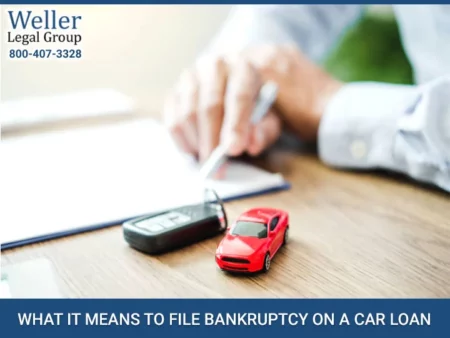 There are a lot of people who mistakenly believe that if they file for bankruptcy, they’ll wipe out their car loan and still keep their vehicle. Unfortunately, this isn’t true. While bankruptcy unwinds your obligation to pay back your car loan, you still need to make payments if you want to keep your vehicle. Here are the answers to a few other common questions regarding this subject.
There are a lot of people who mistakenly believe that if they file for bankruptcy, they’ll wipe out their car loan and still keep their vehicle. Unfortunately, this isn’t true. While bankruptcy unwinds your obligation to pay back your car loan, you still need to make payments if you want to keep your vehicle. Here are the answers to a few other common questions regarding this subject.
How does bankruptcy work regarding my vehicle?
When you file for bankruptcy, the contract that requires you to repay your car loan is broken. This means that you can return the car without paying anything more, but if you want to keep your vehicle, you should know that the bank’s lien isn’t eliminated. Therefore the bank can still repo your car when you don’t pay them as agreed. This can happen as soon as your bankruptcy ends or, with the court’s permission, sooner. It doesn’t matter that you’ve erased the debt; you still need to pay for it.
How can I keep my vehicle if I file for bankruptcy?
The good news is that just because you file for bankruptcy doesn’t mean you have to lose your vehicle. How you handle the situation will depend on the bankruptcy chapter you file, though.
Chapter 7 Bankruptcy
If you’ve filed for a Chapter 7 bankruptcy, there are two people that you must please if you want to keep your car: your Chapter 7 bankruptcy trustee and the car lender. To satisfy them, you’ll need to do different things.
For the bankruptcy trustee, you’ll need to have a bankruptcy exemption that protects all of your vehicle’s equity. Therefore you should start by deciding if a “motor vehicle exemption” is possible. If it isn’t enough to cover your vehicle’s equity, look for a “wildcard” exemption. By protecting all of your vehicle’s equity, you’ll be able to satisfy your bankruptcy trustee. However, to satisfy the car lender and their lien, you’ll need to do a little more work.
One thing your lender will want to see is that you’re current on your car loan and that you’re able to remain current after your bankruptcy case ends. Otherwise, the lender can repossess the vehicle according to the lien rights. If you can’t do this, your other option is to “redeem” the car by paying the lender the actual value of the vehicle.
Chapter 13 Bankruptcy
When you file for a Chapter 13 bankruptcy, you’ll be able to pay off the remaining balance of your vehicle’s loan during the 3 – 5 years of your Chapter 13 repayment plan. However, if you don’t make the payments and catch up on any arrearages you may already have, the lender can repossess your car.
When should I return a vehicle or get out of a car loan?
When you file for bankruptcy, you may find that your best option is to return your car and its loan to your lender. Doing so lets you out of the car loan entirely. There are some very good reasons for choosing to do this, including:
- You find that you’ve paid too much for the vehicle
- You can no longer afford to make the monthly payment
- You don’t want the vehicle and the loan that’s associated with it
If you find yourself in this situation, make sure that you check the box indicating that you want to “surrender the property” when you’re filling out your Statement of Intention for Individuals Filing Under Chapter 7 form. Of course, in Chapter 13 bankruptcy, you can also choose to surrender your vehicle, but it’s done in a different way.
Do you need more help with bankruptcy?
The Weller Legal Group in Clearwater, FL, makes it easy to understand how to file for bankruptcy. We want to show you how this process can benefit you, so when you’re ready, give us a call.
Picture Credit: VistaCreate

